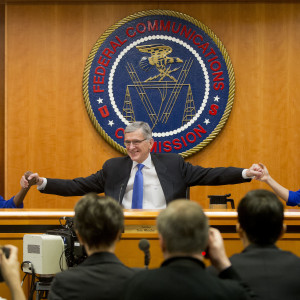The D.C. Circuit Court of Appeals upheld the Federal Communications Commission’s net neutrality order Tuesday with the release of a ruling half-a-year in the making, handing FCC Chairman Tom Wheeler a major victory over internet service providers.
“Today’s ruling is a victory for consumers and innovators who deserve unfettered access to the entire web, and it ensures the internet remains a platform for unparalleled innovation, free expression and economic growth,” Wheeler said in a statement Tuesday.
“After a decade of debate and legal battles,” he continued, “today’s ruling affirms the commission’s ability to enforce the strongest possible internet protections – both on fixed and mobile networks – that will ensure the internet remains open, now and in the future.”
Monday’s ruling uphold’s the commission’s 2015 Open Internet Order, passed last February to reclassify broadband providers and common carriers — the same designation used to regulate telephone providers as public utilities and prevent monopoly control. The rulemaking bans providers from blocking, throttling or prioritizing web traffic from edge providers like Netflix, Amazon or YouTube.
The ruling, likely to be appealed to the Supreme Court, is a further victory for edge providers, who will not have to pay higher prices to providers for sending large amounts of downstream video traffic to subscribers, despite using more average network capacity than other websites.
Industry lobbyist groups U.S. Telecom, National Cable & Telecommunications Association and CTIA – The Wireless Association – sued the FCC for members including AT&T, Verizon, Century Link and Comcast in the court where similar rules, which stopped short of reclassification, were struck down by one of the same judges on the panel that heard oral arguments in December.
Judges David Tatel and Sri Srinivasan, who initially alongside Judge Stephen Williams sounded skeptical of the rules’ application to mobile broadband, struck down all challenges to their legality. Judge Williams dissented in part, describing the rules as ‘watery thin and self-contradictory.”
“The ultimate irony of the commission’s unreasoned patchwork is that, refusing to inquire into competitive conditions, it shunts broadband service onto the legal track suited to natural monopolies,” Williams wrote.
“Because that track provides little economic space for new firms seeking market entry or relatively small firms seeking expansion through innovations in business models or in technology,” he continued, “the commission’s decision has a decent chance of bringing about the conditions under which some (but by no means all) of its actions could be grounded — the prevalence of incurable monopoly.”
Judge Tatel previously struck down two prior attempts by the FCC to pass net neutrality rules, including in a lawsuit filed by Verizon that struck down the 2010 Open Internet Order in 2014.
In December opponents challenged the FCC on several legal fronts, including the 1996 Telecommunications Act’s internet exemption from Title II, failing to give providers sufficient notice the FCC planned to fundamentally change market regulations and accusations the rules exceeded the FCC’s congressionally-mandated authority and violate ISPs’ First Amendment rights.
Prior to the Open Internet Order the FCC classified mobile broadband as a personal service, not a fixed network edge provider like Netflix and Amazon. Lawyers arguing against the rules used that change in designation to especially target the proposal’s lack of notice.
Associate general counsel for the FCC Jacob Lewis defended the proposal, arguing challengers should have been able to “figure out” the notice could apply to wireless as a “functional equivalent” of wired, quoting the term used in the order.
Industry groups and Republicans in Congress and at the FCC have argued since the rules were announced they would slow broadband deployment and innovation, and disincentivize providers from investing in their networks.
FCC Commissioner Ajit Pai has repeatedly testified alongside Wheeler to dissent from the agency’s Democratic majority, which passed the rules along a partisan 3-2 vote last February.
“I am deeply disappointed by the D.C. Circuit’s 2-1 decision upholding the FCC’s Internet regulations,” Pai said in a statement Tuesday. “For many of the reasons set forth in Judge Williams’ compelling dissent, I continue to believe that these regulations are unlawful, and I hope that the parties challenging them will continue the legal fight.”
“The FCC’s regulations are unnecessary and counterproductive,” he added.
Earlier this year the process behind how the rules were drafted became the subject of an investigation by Republicans in Congress, which suggested the White House exerted inappropriate influence on the independent agency to pass the rules.

